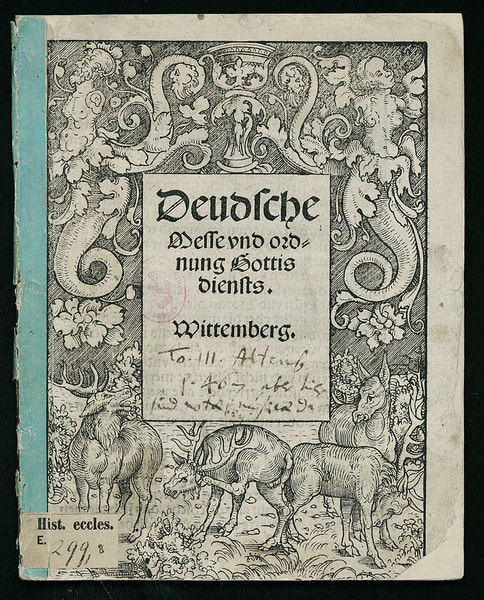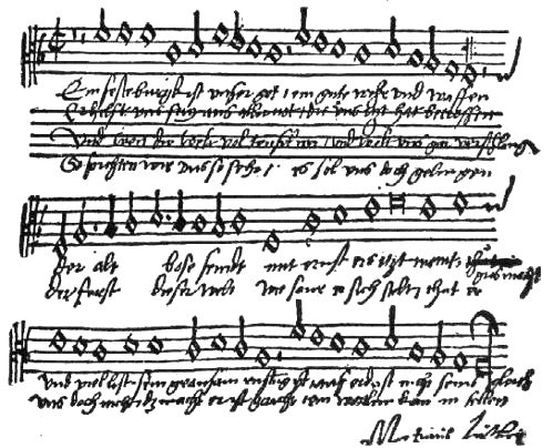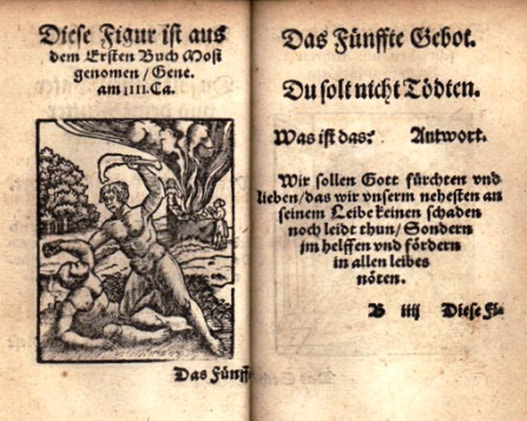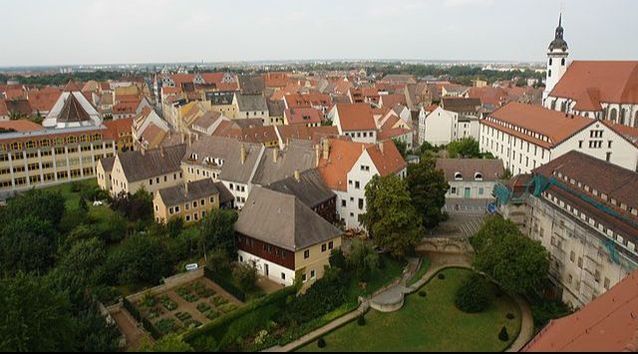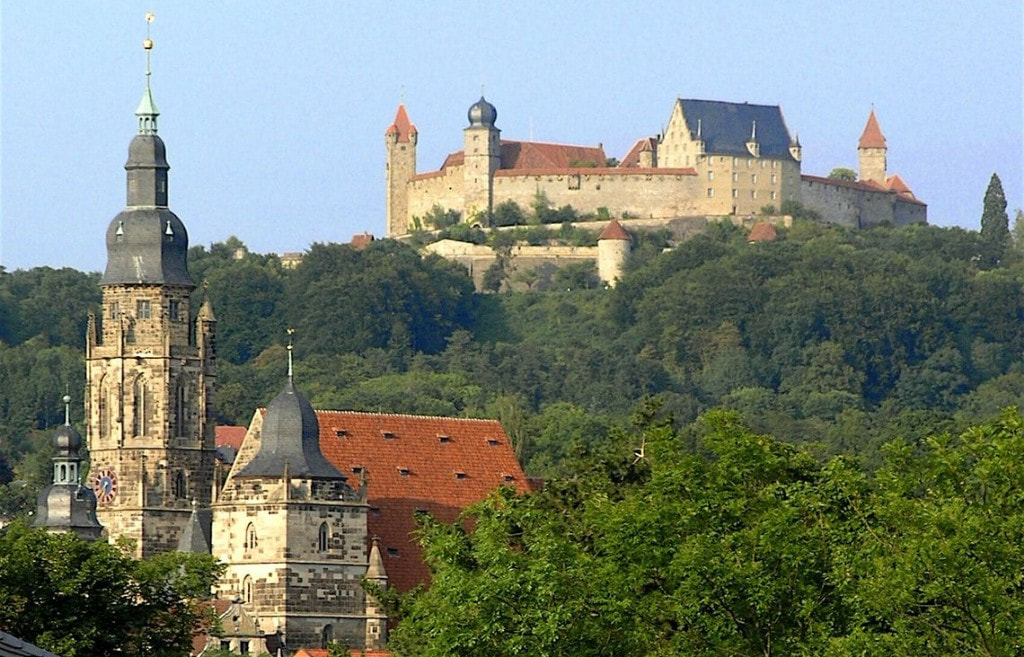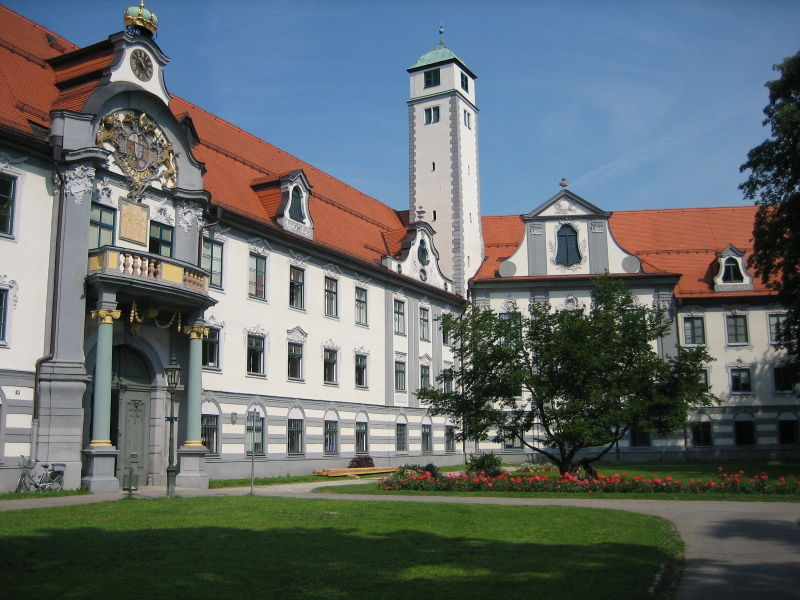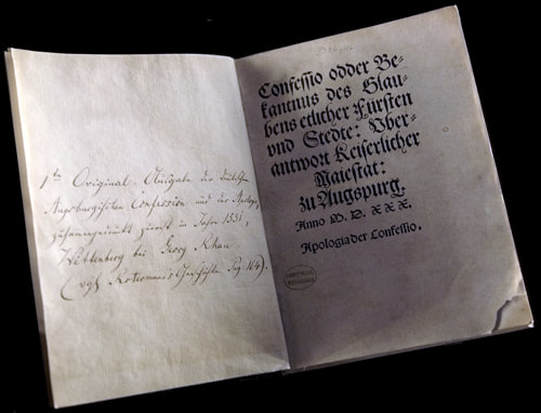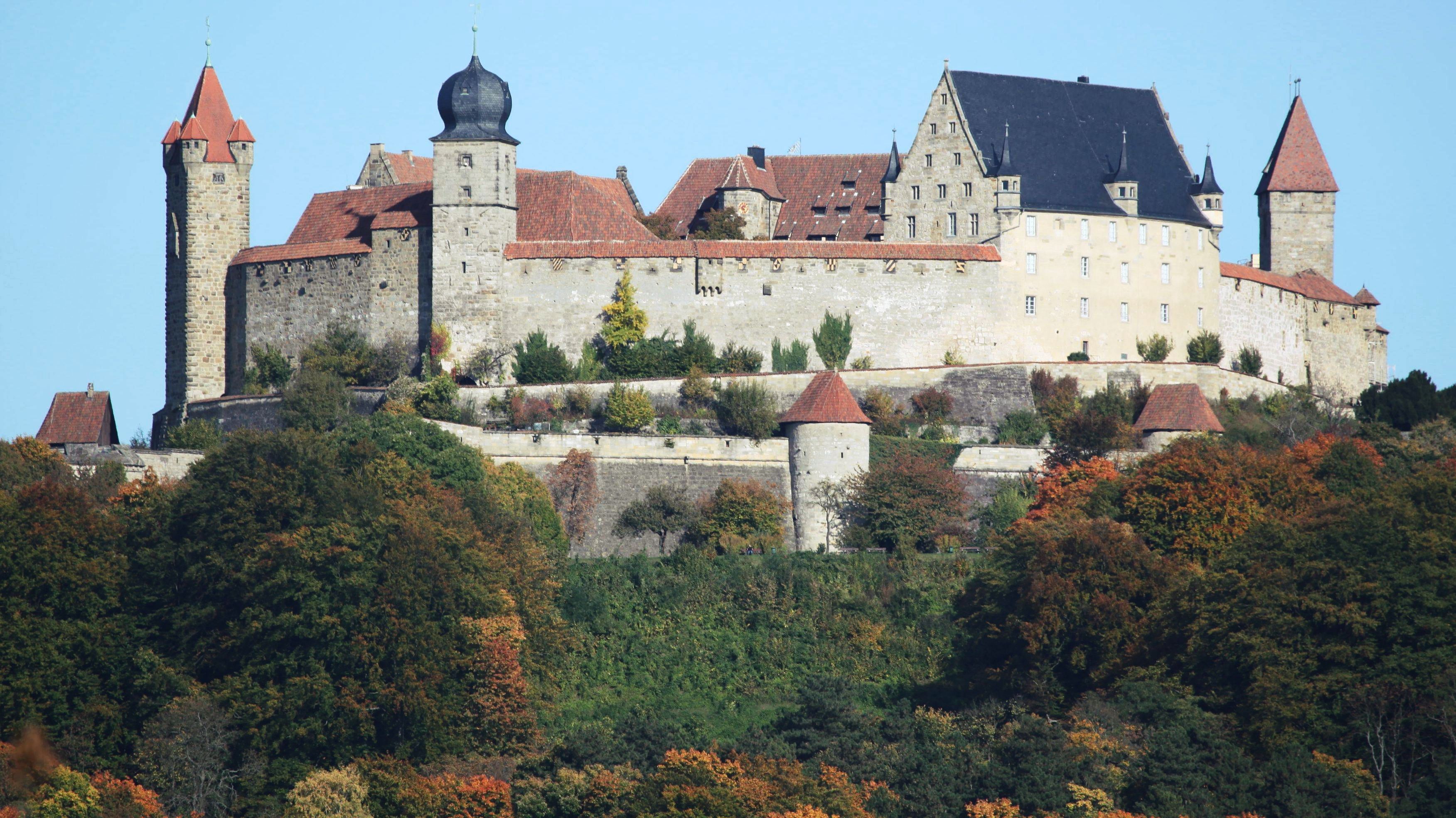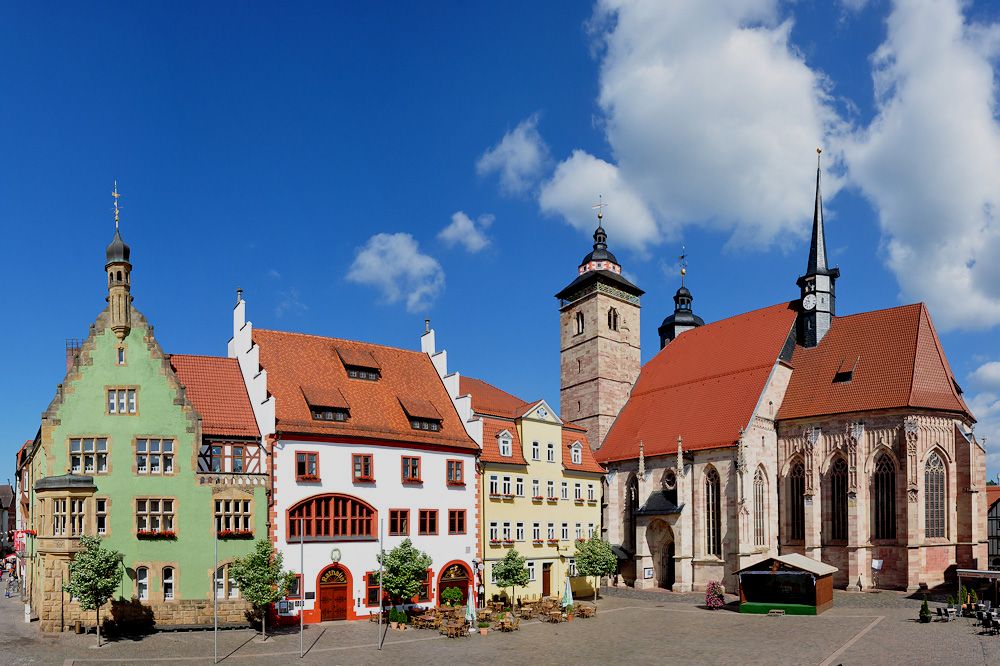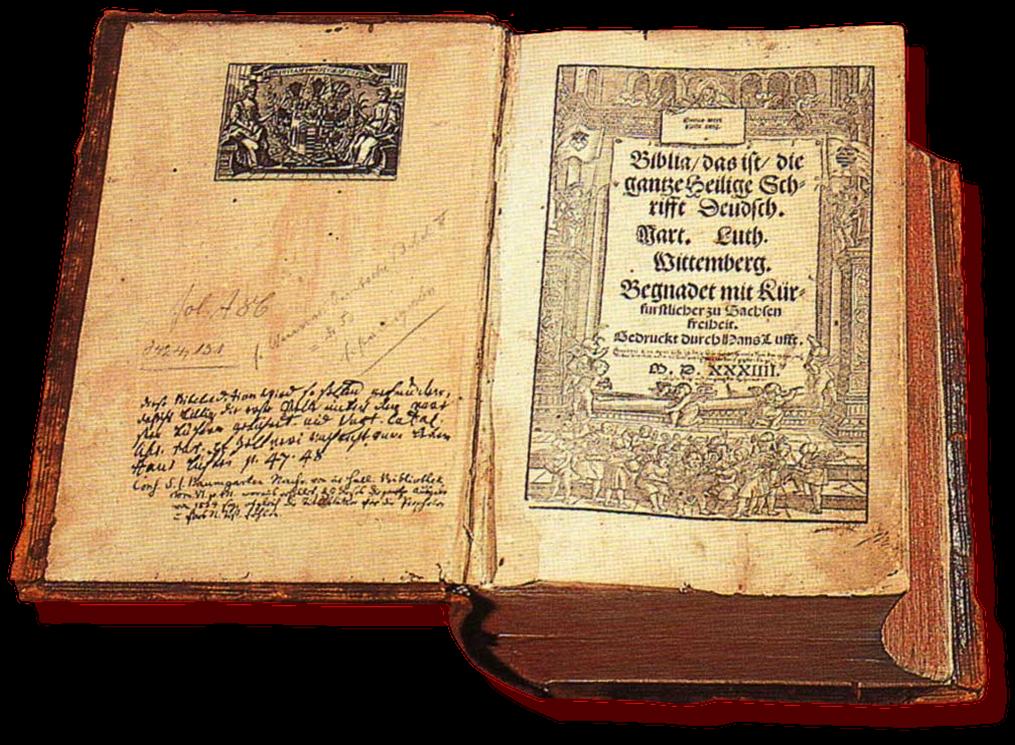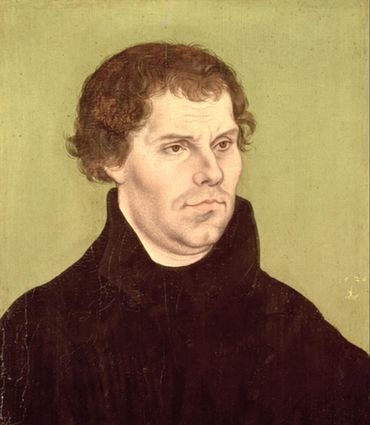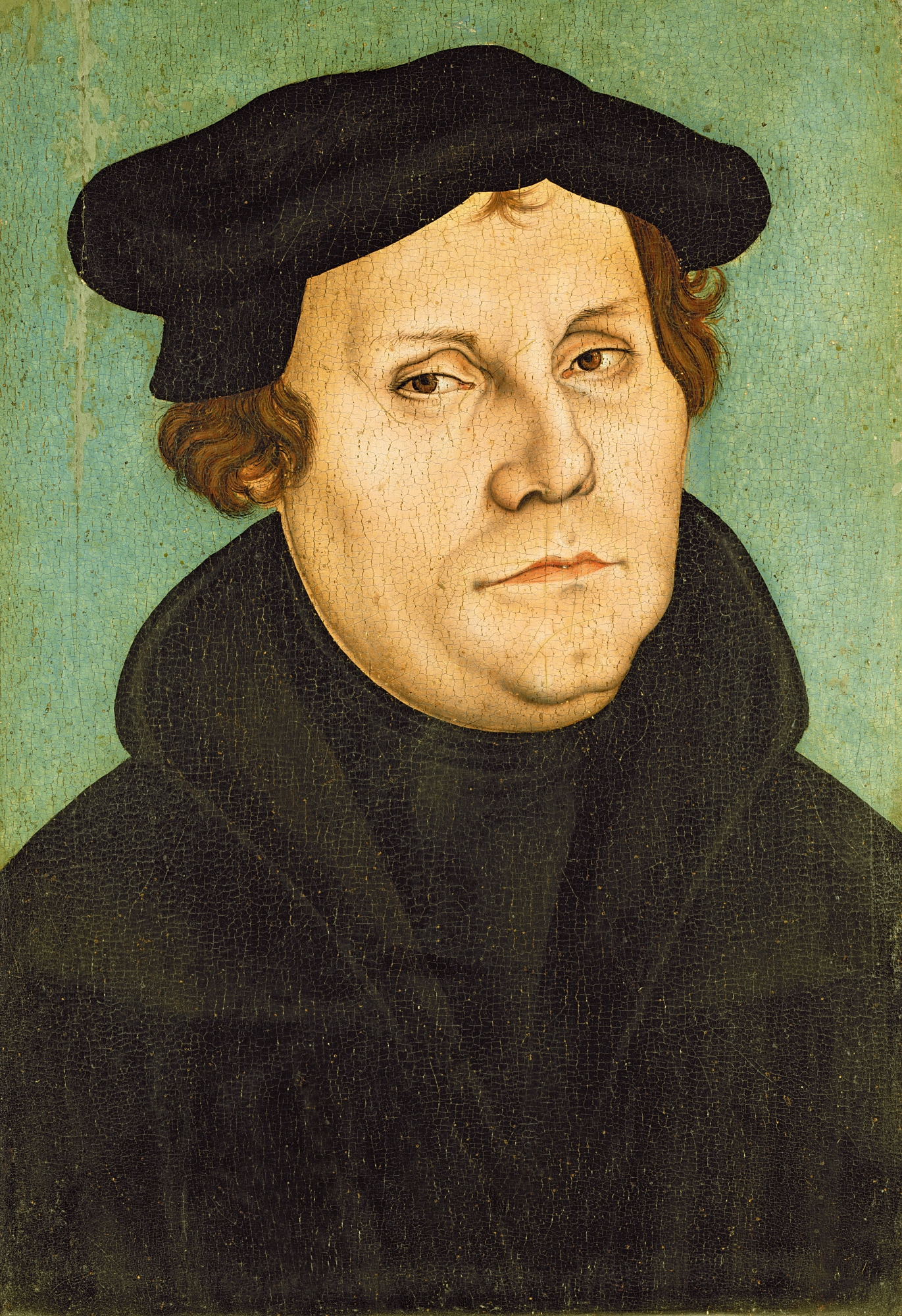Luther Church Leader
With a strong and often abrasive personality, Luther took up the weapons of pen and pulpit against the corruptions of Catholicism on one side and the extremes of the Radical Reformation on the other. He spoke out against clerical celibacy, papal abuses, the denying of the scriptures and the communion wine to non-clergy, the cult of saints, salvation by works, and other Catholic doctrines. Luther's late-in-life marriage was an island in a storm. Nearly everything else was chaos... worsening health... the Turks... Black Death... births (and deaths) of children, composing hymns, translating, writing, writing and more writing... a hard-hearted emperor Charles... the Pope...
|
January 1526 (age 42) - Luther published Deutsche Messe und Ordnung Gottis Dientis (German Mass and Order of Divine Service), a collaboration by Luther, Conrad Rupff and Johann Walter. It was written in German for common people and was based on the Catholic service. But everything that hinted of sacrifice was omitted. It allowed for a longer sermon; communion included both bread and wine. Luther blasted those who criticized his concept of real presence in the communion elements:
It is precisely the same devil who now assails us through the fanatics by blaspheming the holy and venerable sacrament of our Lord Jesus Christ, out of which they would like to make mere bread and wine as a symbol or memorial sign ...They will not grant that the Lord's body and blood are present, even though the plain, clear words stand right there: Eat, this is my body, Drink, this is my blood. June 7, 1526 - Johannes Luther II, known as Hans, was born. Per ancient custom, Hans was bound in a tightly wrapped cloth. Luther said, "Kick little fellow. That is what the Pope did to me, but I got loose."
Hans is beginning to cut his teeth and making a joyous nuisance of himself. These are joys of marriage of which the Pope is not worthy. August 1526 - The Imperial Diet of Speyer made Protestant reforms legal. Local rulers were able to decide how much reform they wanted within their own territories. The Diet temporarily suspended the Edict of Worms and its condemnation of Luther, who saw it as a reprieve on the charge of heresy. The action of the Diet, along with an ongoing feud between Emperor Charles and Pope Clement was highly favorable to the Reformation.
Luther suffered heart problems and dizziness (possibly Meniere's disease) in addition to his perennial digestive and intestinal difficulties. He attributed his poor health to the severity of his life in the monastery. April 1527 - Luther wrote Whether These Words: This is My Body. May 1527 - Instead of fighting the Ottoman Turks, mutinous Spanish troops and German mercenaries of Holy Roman Emperor Charles V marched against Pope Clement VII who joined Francis I of France in founding the League of Cognac, an alliance of France, Milan, Venice, Florence and the Papacy that opposed Charles. With their pay in arrears, Charles' troops looted Rome. An estimated 6,000 to 12,000 people were killed and many of the soldiers who remained in city died from diseases caused by the large number of unburied corpses. During the attack, Clement sought refuge in the Castel Sant’Angelo in Rome and then lived outside the city for almost a year. Luther commented:
Christ reigns in such a way that the Emperor who persecutes Luther for the Pope is forced to destroy the Pope for Luther. The sack of Rome damaged the papacy's prestige and freed Charles V to act against the Reformation in Germany and against those German princes who sided with Luther.
ca, 1527-1529 - Luther wrote the music and lyrics of A Mighty Fortress is our God (German, Ein feste Burg ist unser Gott). The words are a paraphrase of Psalm 46. The hymn was popular with the common people of reformation-era Germany, being sung continually in the streets and chanted by martyrs as they awaited their grim fate. One writer said that Luther provided the hymn so that the people could answer God in their songs.
The Devil hates music because he cannot stand gaiety, and Satan can smirk but he cannot laugh; he can sneer but he cannot sing. The earliest extant hymnal in which it appears is that of Andrew Rauscher (1531), but it is supposed to have been in Joseph Klug's Wittenberg hymnal of 1529, of which no copy exists. Before that it is supposed to have appeared in the Hans Weiss Wittenberg hymnal of 1528, also lost. This evidence would support its being written in 1527–1529, since Luther's hymns were printed shortly after they were written.
Mid summer 1527 - Plagued by ill health Luther suffered from depression. He felt powerless to help those of his followers suffering for their faith. August 2, 1527 - Black death struck Wittenberg. Elector John evacuated the university to Jena, but Luther remained in Wittenberg to minister to the plague victims. His son Hans contracted the plague but survived. December 1, 1527 - Elisabeth Luther was born, but she was not well, possibly because of Katharina's exposure to the black death while pregnant. By the end of 1527, Saxony was, for all practical purposes, entirely Protestant. May 4, 1528 - Elisabeth Luther, 7 months old, died. Katharina wrote: The good Lord gave me a little girl, the sweet little Elisabeth. I am happy and grateful to the Lord! Here, the plague is dead and buried. However, it seemed as if the terrible scourge had marked the child, even before she was born. After seven months, the sweet little Elisabeth said goodbye to her father and her mother to go to Christ, passing through death into life. And Luther wrote to a pastor in Zwickau:
My little daughter, my little Elisabeth, has died. It is marvelous how this grieves me; it has left my spirit almost womanish, so much am I moved by compassion. I never could have believed before that parents’ spirits could be so tender toward a child. February 21, 1529 (age 45) - Second Diet of Speyer (held through April 22) set aside the first Diet's judgment. The Catholics believed it to be a fair compromise. The Lutheran princes felt that "Christ was again in the hands of Caiaphas and Pontius Pilate." They refused to accept the decree and drafted a document that began:
We protest by these presents, before God, our only Creator, Preserver, Redeemer, and Savior, and who will one day be our Judge, as well as before all men and all creatures, that we and for our people, neither consent nor adhere in any manner whatsoever to the proposed decree, in anything that is contrary to God, to His holy word, to our right conscience, to the salvation of our souls. From this statement the terms "Protestant" and "Protestantism" became associated with the Church Reform movement.
Teaching the Faith March 1529 - Martin Luther published Der Kleine Katechismus, or small catechism, in both Latin and German editions for students and others beginning their religious education. April 1529 - Luther published Der Grosse Katechismus, or large catechism for pastors and teachers. Both of these pedagogical works provided easily accessible instructional and devotional material on the Ten Commandments, the Apostles' Creed, the Lord's Prayer, baptism and the Lord's Supper. May 4, 1529 - Magdalena Luther born. She was the third child but first surviving daughter. Luther reported to Nicholas von Amsdorf that Katharina had gone into labor and after three hours, had delivered, without any difficulties, a perfectly healthy baby daughter. She was a much loved child and she was nicknamed Lenchen. Luther also asked Amsdorf to be godfather to "the little heathen and to help her [enter] holy Christendom through the holy, precious sacrament of baptism."
October 1-4, 1529 - Marburg Colloquy (conference) convened. Luther met with Ulrich Zwingli at Marburg Castle. German and Swiss theologians attempted to hammer out a theological statement they both could agree on, hoping for Protestant unity . After agreeing on 15 articles of faith (infant baptism, the word of God, grace, confession, etc.), the discussions focused on the nature of the Lord's Supper. Luther maintained that the consecrated bread and wine were united to the true body and blood of Christ for all participants to eat and drink "this is my body, this is my blood"). Zwingli considered bread and wine only symbols of the body and blood of Christ. How could anyone deny infant baptism after watching their own child die unexpectedly, as Luther had to do with his 7-month-old daughter Elisabeth. The conference ended without an agreement, but did lead the way to later agreements, for example, the Schmalkaldic League of 1531 and the Wittenberg Concord of 1536. Augsburg Confession
April 1530 (age 46) - In an effort to restore church unity and rally support against a Turkish invasion, Emperor Charles V called on the German Princes to present a summary of Lutheran beliefs at the Diet of Augsburg. Elector John of Saxony directed Martin Luther, Justus Jonas, Johannes Bugenhagen and Philipp Melanchthon to meet in Torgau and draft a summary of Lutheran beliefs to be presented to the Holy Roman Emperor at the diet. This summary was called the Torgau Articles. April 23, 1530 - Elector John and the reformers reached Coburg Castle, about 56 miles south of Erfurt. There, Luther was left behind because he was an outlaw according to the Edict of Worms.
May 1, 1530 - While Luther was at Coburg he received word that his father Hans had died.
This death has certainly thrown me into sadness, thinking not only of nature, but also of the very kind love, for through him my Creator has given me all that I am and have.. May 2, 1530 - The reformers, minus Luther, reached Augsburg. On the journey, Melanchthon drafted a statement of Lutheran beliefs to present to the Diet. He based it on the Torgau Articles and sent it to Luther at Coburg on May 11 for his approval.
May 13, 1530 - Luther wrote to Elector John: I have read through Master Philipp's Apologia (as the Augsburg Confession was first known), which pleases me very much; I know nothing to improve or change it. On June 23, 1530 - Final form of Melanchthon's Apologia was adopted. He sought to defend Lutherans against misrepresentations and to provide a forceful document that would be acceptable to Roman Catholics, and thus be the basis for reconciliation between the Lutheran Reformers and the Roman Church.
June 25, 1530 - Lutheran princes insisted on a public reading of the confession, as opposed to presenting it to the Emperor. In order to exclude those who supported reform, the reading was moved to the little chapel of the Bishop;s Palace instead of the spacious city hall where the meetings of the diet were usually held. Two Saxon chancellors, Christian Beyer, with the plain German copy, and Gregor Bruck, with the traditional Latin copy, stepped into the middle of the assembly, against the wish of the emperor. The reading of the German version of the text by Beyer lasted two hours and was so distinct that every word could be heard by those assembled outside. Today, a plaque marks the historic place: On this site the Augsburg Confession (Confessio Augustana) was read in German on June 25, 1530 by Christian Beyer, in the presence of Emperor Charles V, the Princes of the Empire and the members of the Imperial Diet, while the jubilant citizens who supported Luther stood outside, listening in front of the open windows of the conference hall. Over the next three months, Johann Eck and other theologians wrote the Confutatio Pontificia stating the Catholic position on the 28 articles of the Augsburg Confession. However, Eck's first draft was so wordy and "vicious" that the Catholic princes refused to submit it to Emperor Charles until it was twice edited and toned down.
August 3, 1530 - The revised version of the Confutation was read at the Diet. It rejected the statements of the Augsburg Confession. The Emperor declared that it properly presented the Catholic faith. Melanchthon hastily wrote a lengthy argument, the Apology of the Augsburg Confession, supporting the Augsburg Confession and refuting the arguments made in the Confutation. It was presented to the Emperor but he refused to accept it. November 19, 1530 - The Diet of Augsburg ended without achieving a compromise. Emperor Charles V declared that the Lutheran confession had been repudiated and reinstated the Edict of Worms, which condemned reform and outlawed those who advocated it. He threatened military force if the reformers failed to consent to return to Catholic practices by April 15, 1531. After Melanchthon returned to Wittenberg, he obtained a copy of the Confutation and rewrote and expanded his Apology to more clearly and completely explain the faith of the Reformers. A Latin edition was completed in April or May and a German translation by Justus Jonas was published in the autumn of 1531. Summary of the 28 statements of belief of the Augsburg Confession
The first twenty-one articles outline what the Reformers believed were the most important teachings in Lutheranism, based on the Bible. The last seven articles identify some of the wrongs and abuses of the Roman Catholic Church and provide arguments for needed reforms.
Luther's stay at Coburg Castle, or Veste Coburg
During the Diet of Augsburg, from April to October 1530, Martin Luther lived in the Veste Coburg under the protection of Elector John the Steadfast. It was strikingly similar to Luther's 11 month stay at the Wartburg Castle after the Diet of Worms, except that he had a family. The stay in Coburg became one of the most productive times of Luther's life. He continued translating parts of the Bible into German and wrote no less than 26 works on issues related to Church reform. He also wrote 120 letters in 172 days, which messengers on horseback took to Wittenberg or Augsburg. One of the letters was to his eldest son, Johann (Hans) in Witternberg, then only four years old. It was written in German, and it was meant to encourage Hans to be diligent in his studies:
Grace and peace in Christ! My dearly beloved son, it pleases me to hear that you are studying well and praying diligently. Do this, my son, and keep it up. When I come home, I will bring you a nice gift from the fair. I know a pretty, lovely, pleasant garden, where many children go; they wear golden coats and gather nice apples, pears, cherries, and plums from under the trees; they sing, jump, and are merry. They also have pretty little horses with golden bridles and silver saddles. I asked the owner of the garden: “Whose children are these?” He said: “These are the children who like to pray, study, and be pious.” So I said: “My dear sir, I also have a son, his name is Hänschen Luther. Might he not come into the garden, too, so that he might also eat such lovely apples and pears, ride such fine horses, and play with these children?” Then the man said: “If he likes to pray, study, and be pious, then he, too, may enter the garden..." In other letters he steadied the Lutheran participants at the Augsburg Diet and kept them from rash decisions. He pressed Philip of Hesse to stand firm and avoid compromise on the meaning of the Lord's Supper, lest it throw the Lutheran cause into reverse. He wrote to Elector John Frederick, urging patience and strength in the midst of what must be "a tiresome situation."
Indeed it must have been an often irksome situation; on the one hand, the theologians, led by Melanchthon, were forever changing the wording of the Augsburg Confession. On the other hand, everyone had to wait patiently for the emperor's arrival as he dallied in Italy and then in Innsbruck. 1531 (age 47) - Luther wrote Warning to his Beloved Germans, discussing the rightness of armed resistance to the emperor. He left the choice to take up arms to the Protestant rulers.
February 27, 1531 - Schmalkaldic League established by Philip I, Landgrave of Hesse, and John Frederick I, Elector of Saxony, the two most powerful Protestant rulers at the time. It originated as a defensive alliance, with the members pledging to defend each other should their territories be attacked by the Holy Roman Emperor Charles V. But, the League quickly became a territorial political movement when breaking from the Catholic Church offered significant economic advantages. In December 1535, the league admitted anyone who would subscribe to the Augsburg Confession. June 30, 1531 - Margarethe Luther (Martin's mother) died.
November 9, 1531 - Martin Luther, Jr. was born. Luther said, If you become a lawyer I will hang you on the gallows. You must be a preacher, baptize and dispense the sacrament, visit the sick and comfort the sorrowful. Martin did study theology, but he devoted his time to scholarly pursuits and never had a regular parish call.
1532 (age 48) - A Turkish invasion in the east forced Charles V to declare a truce with the Schmalkaldic League, the Peace of Nuremberg, which cancelled legal cases in progress before the Imperial Supreme Court and granted freedom of religion to Protestants until a general church council met, but no date was given. In return, the League would agree to provide financial and military support against the Turks. Luther was grateful that the immediate threat of war had passed. 1533 (age 49) - Luther helped reform the theology faculty at the University of Wittenberg. January 1533 - King Henry VIII of England married Anne Boleyn. Three months later she gave birth to a daughter, Princess Elizabeth (future Queen Elizabeth I). Pope Clement VII responded to the marriage by excommunicating Henry. January 29, 1533 - Paul Luther was born. 1534 (age 50) - After twelve years Luther finished translating the Old Testament into German There are some who have a small opinion of the Old Testament, thinking of it as a book that was given to the Jewish people only but Christ says, 'Search in the scriptures, for they give testimony of me' ... therefore the Old Testament is to be highly regarded,
Luther's Bible was not a word-for-word literal translation. Luther used the variant of German spoken in Saxony, intelligible to both northern and southern Germans. He intended to make the Bible accessible to everyday Germans, "for we are removing impediments and difficulties so that other people may read it without hindrance." Germans everywhere bought Luther's Bible, not only for the salvation of their souls, but for prestige. It was the must-have book. Everyone read it or listened to it being read. Its phrasing became the people's phrasing, its speech patterns their speech patterns. Hans Lufft, whose printing press was set up in the basement of the Luther home, published almost 100,000 copies of Luther's Bible translation. nearly 180 million pages! There were no copyright laws; Luther received no royalties. 1534 - Ignatius Loyola founded the Society of Jesus (Jesuits) with the purpose of preaching and winning over new converts to the Catholic church. Jesuits dedicated themselves to teaching and stressed the importance of preaching and obedience to the Pope; believed it was essential for Christians to unite and that Protestant theology was flawed. September 25, 1534 - Death of Pope Clement VII. October 13, 1534 - Clement was succeeded by Paul III. He came to the papal throne in an era following the sack of Rome in 1527 and rife with uncertainties in the Catholic Church following the Protestant Reformation. He convened the Council of Trent in 1545. March 21, 1536 (age 52) - The Wittenberg Concord, a conference of Lutheran and Zwinglian theologians, met at Luther's home. It was an attempted resolution of their differences with respect to the Real Presence of Christ's body and blood in the Eucharist. The Wittenberg Concord was adopted by churches within the Holy Roman Empire, but not by the Swiss. It is generally regarded as a failure because it did not bring an end to the Eucharistic controversy. We confess, according to the words of Irenaeus, that the Eucharist consists of two things, one earthly and one heavenly. Therefore they think 3 and teach that Christ’s body and blood are truly and substantially present, exhibited, and taken with the bread and wine.... The tenor of relations between the two sides is best illustrated by the exchange between Zwingli and Luther at Marburg in 1529.
The Reformed signers included Martin Bucer, Wolfgang Fabricius Capito, Matthäus Alber, Martin Frecht, Jakob Otter and Wolfgang Musculus. The Lutheran signers included Martin Luther, Philipp Melanchthon, Johannes Bugenhagen, Justus Jonas, Caspar Cruciger, Justus Menius, Friedrich Myconius, Urban Rhegius and Georg Spalatin The Wittenberg Concord is considered a foundation document for Lutheranism but was later rejected by the Reformed signers.. 1537 (age 53) - In preparation for an intended ecumenical Church council Elector John Frederick "the Magnanimous" of Saxony asked Luther to prepare a summary of Lutheran beliefs for presentation at a meeting of the Schmalkaldic League. The Schmalkald Articles, as they became known, are divided into three sections.
The league chose not to adopt Luther's Schmalkald Articles because Philipp Melanchthon was concerned Luther's writing would be regarded by some as divisive. Instead, Melanchthon was asked to write a clear statement on the Papacy, which he completed February 17, 1537. This document, the Treatise on the Power and Primacy of the Pope, the Tractate for short, was adopted as an appendix to the Augsburg Confession, which did not have a specific article dealing with the office of the Papacy. Four statements from Melanchthon's Tractate:
Luther's Schmalkald Articles were highly prized by John Frederick who ordered they be made a part of his last will and testament. Though they were not adopted at the meeting of the Schmalkaldic League in 1537, they were widely read, and 44 theologians signed them as an expression of their personal faith. Subsequently they were incorporated into the Book of Concord, along with Melanchthon's Tractate. Luther's Later Years >>> |
Timeline
1526 --
1527 --
Luther's Table Talk
At the home of Martin Luther, the four-story, former monastery at the eastern end of Wittenberg, it was open house all year long. University students boarded there, visitors used it as a hotel, family and friends dropped in. At mealtimes, Luther made observations and amused guests with his sense of humor. Students wrote down nearly everything. After Luther's death the notes were compiled and published in a book called Luther's Table Talk (German "Tischreden"). When sharing his thoughts Luther was not hindered by niceties like prudence and propriety. He was blunt and outspoken, sometimes using rather course language.
|

